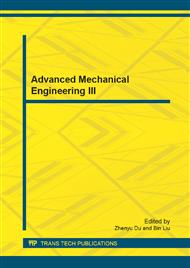p.48
p.54
p.59
p.64
p.69
p.75
p.80
p.84
p.88
Failure Modes Mechanisms Effects Analysis for Refrigeration Device
Abstract:
FMMEA (failure mode, mechanisms, and effects analysis) is an effective tool for the life-cycle management of products and devices. We conducted an FMMEA for a refrigeration device at the request of a corporation. This paper demonstrates the process of our analysis of the compressor by employing Ganesan’s methodology. The results are listed in a table, including the physics of failures, risk priorities and parameters for monitoring. This paper also provides health-state assessment approaches based on FMMEA results and values of relevant parameters using fusion approach. Such assessment can be used for remaining useful life (RUL) estimation. Additionally, the paper illustrates our approach of computer-program-based automatic identification of failure using data of parameters retrieved from sensors.
Info:
Periodical:
Pages:
69-74
DOI:
Citation:
Online since:
February 2013
Authors:
Price:
Сopyright:
© 2013 Trans Tech Publications Ltd. All Rights Reserved
Share:
Citation:


